|
|
|
Sort Order |
|
|
|
Items / Page
|
|
|
|
|
|
|
| Srl | Item |
| 1 |
ID:
128632
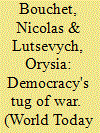

|
|
|
| 2 |
ID:
117514
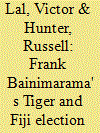

|
|
|
|
|
| Publication |
2012.
|
| Summary/Abstract |
Riding the tiger is a hazardous sport. To fall off it or to attempt to dismount it, even, is to be eaten; and it is precisely this predicament that the South Pacific region's first and only military strongman finds himself in Fiji.
On 5 December 2006 Commodore Josaia Voreqe (Frank) Bainimarama deposed a lawfully elected multi-party SDL-FLP government by force of arms. This was, as he and his inner circle are well aware, nothing short of treason for which the penalty is life imprisonment. So he now seeks to be somehow spirited from the tiger's back by a promise of elections in 2014 and the construction of yet another constitution under the chairmanship of Kenyan professor Yash Ghai.
|
|
|
|
|
|
|
|
|
|
|
|
|
|
|
|
| 3 |
ID:
165648
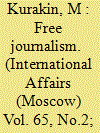

|
|
|
|
|
| Summary/Abstract |
IN DECEMBER 2018, an international forum, "Freedom of Journalism in the Context of Human Rights, New Technologies and International Information Security," took place in Pezinok, a suburb of Bratislava, the capital of Slovakia. It was attended by more than 70 experts and members of the media from 12 countries. The forum was organized by Moscow State University, the International Affairs journal, the Russian Union of Journalists, and several foreign media outlets. Russian Ambassador to Slovakia Alexey Fedotov said in his welcoming remarks that Bratislava is perhaps the best venue for such international conferences, considering the high level of mutual understanding that exists between Russia and Slovakia, as well as common Slavic historical traditions.
|
|
|
|
|
|
|
|
|
|
|
|
|
|
|
|
| 4 |
ID:
085602
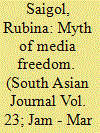

|
|
|
| 5 |
ID:
110558
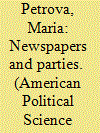

|
|
|
|
|
| Publication |
2011.
|
| Summary/Abstract |
Media freedom strongly inhibits corruption and promotes good governance, but what leads to media freedom? Do economic development and higher advertising revenues tend to make media outlets independent of political groups' influence? Using data on nineteenth-century American newspapers, I show that places with higher advertising revenues were likelier to have newspapers that were independent of political parties. Similar results hold when local advertising rates are instrumented by regulations on outdoor advertising and newspaper distribution. In addition, newly created newspapers were more likely to enter the market as independents in places with higher advertising rates. I also exploit the precise timing of major changes in advertising rates to identify how advertising revenues affected the entry of new newspapers. Finally, I demonstrate that economic development, and concomitant higher advertising revenue, is not the only reason that an independent press expands; political factors also played a role.
|
|
|
|
|
|
|
|
|
|
|
|
|
|
|
|
| 6 |
ID:
193628
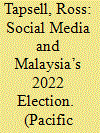

|
|
|
|
|
| Summary/Abstract |
This article argues that Malaysia’s 2022 General Election (GE15) amplified negative campaigning via new techniques associated with platform and technological advancements, led by creative innovations in campaign tactics, including livestreaming and video content. GE15 was the freest election campaign in Malaysia’s history. All political parties and coalitions enjoyed access to a wide range of mainstream and online media to disseminate content, and new platforms like TikTok emerged as influential conduits of campaign messages. Yet serious problems in this digital public sphere remain a feature of the country’s media landscape. These include cybertroopers, fake news peddlers, and those creating polarizing content around race and religious issues. This article explains how social media campaigning in Malaysia is becoming more professionalized and better resourced, inspiring some diversity and creativity, while at the same time enabling groups who spread narratives intended to incite and enrage, particularly via video content. The Malaysian case exemplifies the growing problems within the contemporary digital public sphere, showing how the professionalization of social media campaigning can lead to disinformation and, ultimately, polarization.
|
|
|
|
|
|
|
|
|
|
|
|
|
|
|
|
| 7 |
ID:
091020
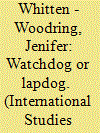

|
|
|
|
|
| Publication |
2009.
|
| Summary/Abstract |
A main justification for press freedom is that free media will act as a watchdog over the government. While we would expect democracies to have free media and autocracies to have government-controlled media, some democracies have government-controlled media, and some autocracies have free media. How this mismatch between regime type and media system influences government behavior is a puzzle worth exploring. One of the most widely criticized government behaviors is the violation of physical integrity rights. The question posed here is, how does media freedom affect government respect for these rights? In this article, I theorize that the relationship between media freedom and government respect for human rights differs, depending on the presence of democratic institutions. The findings support my premise. Specifically, the influence of media freedom on government respect for human rights is negative for the most autocratic regimes and positive for only the most democratic regimes.
|
|
|
|
|
|
|
|
|
|
|
|
|
|
|
|
| 8 |
ID:
183632
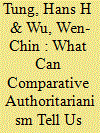

|
|
|
|
|
| Summary/Abstract |
This paper evaluates the progress and impact of the literature on comparative authoritarianism, showing not only how its development over the previous two decades can help us understand China’s authoritarian politics better, but also how the latter can move the former forward. We focus on two important topic areas in the literature: authoritarian power-sharing and autocratic politics of information (e.g., partial media freedom and government censorship). For the first topic, we shall review the literature on the authoritarian power-sharing between dictators and their allies and explicate how this conceptual innovation helps us understand the institutional foundation of China’s regime stability and phenomenal economic performance before Xi Jinping. The analysis then provides us a baseline for assessing China’s economic and political future under Xi Jinping given his clear departure from the pre-existing power-sharing framework. Finally, this paper also assesses the relevance of the literature on authoritarian politics of information to the Chinese context. In sum, we not only emphasize the conceptual contributions of the literature of comparative authoritarianism to the field of Chinese politics, but also identify lacunae in the current literature and avenues for future research that post-Xi political developments have made visible to us.
|
|
|
|
|
|
|
|
|
|
|
|
|
|
|
|
| 9 |
ID:
093224
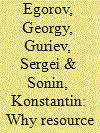

|
|
|
|
|
| Publication |
2009.
|
| Summary/Abstract |
Every dictator dislikes free media. Yet, many nondemocratic countries have partially free or almost free media. In this article, we develop a theory of media freedom in dictatorships and provide systematic statistical evidence in support of this theory. In our model, free media allow a dictator to provide incentives to bureaucrats and therefore to improve the quality of government. The importance of this benefit varies with the natural resource endowment. In resource-rich countries, bureaucratic incentives are less important for the dictator; hence, media freedom is less likely to emerge. Using panel data, we show that controlling for country fixed effects, media are less free in oil-rich economies, with the effect especially pronounced in nondemocratic regimes. These results are robust to model specification and the inclusion of various controls, including the level of economic development, democracy, country size, size of government, and others.
|
|
|
|
|
|
|
|
|
|
|
|
|
|
|
|
|
|
|
|
|